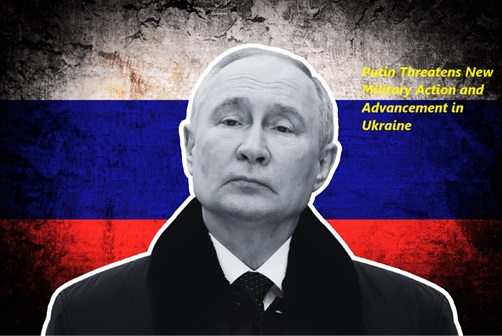Russian President Vladimir Putin has declared that Russia will lift its self-imposed restrictions on the deployment of medium-range missiles if the United States proceeds with similar deployments. This announcement signals a comprehensive response from Russia should medium- and short-range nuclear missiles be stationed in Europe and Asia.
In a recent meeting with top officials from the Russian Defense Ministry, Putin emphasized that modern weaponry now constitutes 95% of Russia’s strategic nuclear forces. He reiterated Russia’s commitment to a policy of nuclear deterrence while simultaneously avoiding entanglement in a full-scale arms race.
Putin attributed the rising tensions in the region to the United States and the North Atlantic Treaty Organization (NATO), accusing the Western alliance of ramping up military spending and bolstering offensive forces near Russian borders. He expressed concern that such escalation threatens Russian national security, compelling Moscow to adopt additional measures to safeguard its interests without igniting an arms race. He also noted the instability of the global military and political landscape, pointing to continued U.S. support for Ukraine with funding and weapons, which exacerbates the conflict.
Putin Signals Progress in Ukraine
In contrast to these concerns, Putin claimed significant progress by the Russian army in Ukraine over the past year, asserting that 189 towns have been liberated along the front lines. According to the Russian Defense Minister, Russian forces have gained control of 4,500 square kilometers of Ukrainian territory, making daily advancements of approximately 30 square kilometers. The military’s offensive operations, particularly in strategic locations such as Pokrovsk, continue to intensify.
Meanwhile, Ukrainian officials report that Russian casualties have surpassed 763,000 soldiers since the war began in February 2022. Ukraine also revealed significant losses in Russian heavy military equipment, including tanks, aircraft, and drones. Fierce fighting persists in multiple regions, with the Ukrainian army successfully repelling Russian advances, bolstered by ongoing support from Western allies.
In this context, the United States and its allies have voiced concerns regarding North Korea’s support for Russia in the Ukraine conflict, characterizing it as a new threat. Putin has also highlighted the enhancement of Russian military capabilities, noting the integration of robotic systems and artificial intelligence to improve battlefield efficiency.
Amid these developments, fears of an expanding conflict are growing, as the world grapples with escalating military tensions and Russia seeks to demonstrate its military strength and readiness to address potential threats.

